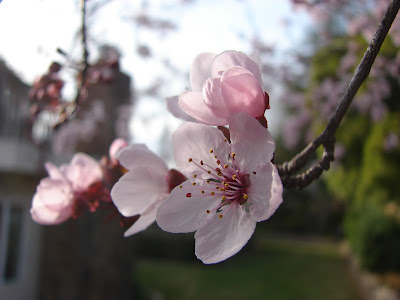The lava field on Hawaii's Big Island looked like the surface of the moon. The black rock, brittle as glass, clawed at our shoes in a landscape where nothing lived. We stopped where the rock turned to a river: a slow ooze of hot lava, glowing dull red beneath its dark crust, hot enough to catch the tips of our walking sticks on fire. We watched it wriggle past our feet to the edge of a cliff, where it plunged into the sea in a waterfall of fire. There, beneath the waves, it was hardening, invisibly adding to the foundations of the Big Island.
Seven months into this freelancing adventure, I'm beginning to think about the cumulative effects of choices. The choices I make today don't stand alone: they're built on the choices I made yesterday and last month and last year. To move home after graduation. To pass up jumping for an immediate 9-to-5 job. To take seriously the gift of writing God has given me. All together, these choices start to form something: the new piece of land I am becoming.
Aristotle said, "We are what we repeatedly do. Excellence, then, is not an act but a habit." It is our cumulative, grace-guided choices that determine the people we will become. Making the right choices is easier when you have a precedent on which to build. It's less difficult to see where you're going next time you take a leap of faith.
But building a new island is difficult when you don't know what you're aiming for. When setting out in a new direction, the first choice (do I trust? Do I risk? Do I sacrifice?) is the scariest. Even the best of role models can't project what results our choices will have. So when we decide to follow God's call, to writing, knitting, homeschooling, ministry, or something else off the beaten path, it can feel like shooting off a cliff in a stream of hot lava, wondering if we're actually going to build something new or just get swept away in the tide.
But, once again, when the first layer is laid, the next is easier--you've set yourself a standard to live up to.
A friend of mine demonstrated this a few weeks ago. She interviewed for two positions, the first less desirable than the second. After the first interview went well, she accepted a job offer there. Then, suddenly, she was offered a job at the second company. Instead of bailing out on her commitment to #1, she turned down a desirable position in order to stick to her word.
Career-builders might scoff at her brave choice. But success is more than a ladder. In choosing to demonstrate integrity, my friend sacrificed immediate gain--but set a precedent for future choices and added another layer onto her island of character. When jobs vaporize and companies fail, that rock still stands.
Of course, there's also a second way. It's so natural that many people, especially those in my age group, opt for this one. It's the easy way out. When faced with a tough choice to land a great job or keep your word, to indulge yourself or honor your family, to beat the established path or trust God to lead you in His way--many people just "go with their gut" and push the long-term implications out of mind. Like Scarlett O'Hara in the wonderful Gone with the Wind, we say "I'll think about that later."
But Rhett (always wise) comes back to her and says, "It's hard to salvage jettisoned cargo and, if it is retrieved, it's usually irreparably damaged. And I fear that when you can afford to fish up the honor and virtue and kindness you've thrown overboard, you'll find they have suffered." (ch. 43). It's hard to go back once you've set a precedent of taking the easy way.
So what kind of an island are you building? If the choices we make today set a precedent, do you dare to take the leap, making choices based on vision, hope, faith? Will you start building from a blueprint you can't see?










